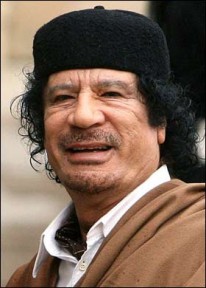 “What this country needs is good, strong military rule!”
“What this country needs is good, strong military rule!”
How often have we heard this or similar sentiments expressed by Indians disgruntled by the deteriorating law and order situation and increasing instances of corruption in high places in the country.
I’ve always maintained that the people glibly advocating such simplistic solutions should go and live in a highly developed country under military rule for some time—a little taste of a totalitarian regime would send them scurrying back to the security of their corrupt, lawless countries, and the freedom that they don’t value, because they take it for granted.
The events of the last two months in the Arab world are living proof of this. Be it Hosni Mubarak of Egypt who stepped down peacefully, President Saleh of Syria, who seems to be preparing to follow suit, or dictators resorting to absolutist crackdown on the protesting populace, viz., Colonel Gaddafi in Libya and King Hamad in Bahrain—the Arab world, held under military dominance for decades, is clamouring for freedom and democracy, even at the cost of their high trajectory of growth, because, after the three basic needs, food, clothing and shelter, there is a fourth basic human need, that is, freedom.
 It is remarkable that none of the four Arab nations currently in the process of political transition from a military regime is an underdeveloped one. Bahrain, in fact, on the strength of its status as a desired corporate destination, ranks 39th on the 2010 Human Development Index—right up there among the ‘very highly developed’ nations! Libya comes in at the 53rd place, with a status of ‘high level of development’. Egypt and Syria, at 101 and 111, rank among the ‘medium developed’ nations. All of these countries, incidentally, rank above India (119th) in terms of the HDI, which is a standard means of measuring well-being in terms of life expectancy, literacy, education and standards of living. This, in turn, would seem to imply that although the people of these countries are rather well-off in terms of the amenities and facilities, they have yet had the impetus to break out in revolt—a revolt that was not a flash in the pan, and that has gathered sufficient momentum to make the breakdown of these well-regulated military regimes appear imminent!
It is remarkable that none of the four Arab nations currently in the process of political transition from a military regime is an underdeveloped one. Bahrain, in fact, on the strength of its status as a desired corporate destination, ranks 39th on the 2010 Human Development Index—right up there among the ‘very highly developed’ nations! Libya comes in at the 53rd place, with a status of ‘high level of development’. Egypt and Syria, at 101 and 111, rank among the ‘medium developed’ nations. All of these countries, incidentally, rank above India (119th) in terms of the HDI, which is a standard means of measuring well-being in terms of life expectancy, literacy, education and standards of living. This, in turn, would seem to imply that although the people of these countries are rather well-off in terms of the amenities and facilities, they have yet had the impetus to break out in revolt—a revolt that was not a flash in the pan, and that has gathered sufficient momentum to make the breakdown of these well-regulated military regimes appear imminent!
My own taste of a military dictatorship, hand-in-hand with high standards of living, came at the age of 11—hardly an age when one understands or contemplates the ins and outs of political regimes, one would say. However, when an 11 year-old suffering from severe travelling sickness is told to throw up inside the car into her mom’s hastily unpacked saree, because it is risky to stop the car on the deserted road near Baghdad Airport (the surveillance is very strict—they’re likely to pepper the car with shots as soon as it stops, before any of us can get down to explain), it does rather encourage thought!
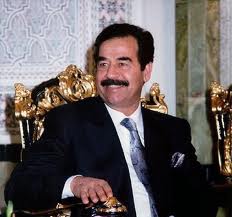 This was when we joined Dad in Saddam’s strife-torn Iraq in 1982, where a couple of Indian public sector companies were constructing grain-storage silos and other strategic structures.
This was when we joined Dad in Saddam’s strife-torn Iraq in 1982, where a couple of Indian public sector companies were constructing grain-storage silos and other strategic structures.
Coming from a third-world India, Baghdad was a revelation—comparable, we were told, to any European capital, in terms of development and facilities. Having left Delhi pre-Asiad, this was our first exposure to world-class flyovers (three-tier ones, at that!), ultramodern buildings, glitzy multi-storied, glass-fronted shopping malls (called Oresdees), ice-cream parlours that made one’s eyes pop out, air-conditioned Toyota cars to travel in, and all the riches of the world, so to say, at one’s feet! This was the new city.
Proceeding to ‘our’ construction site at Tuz Kharmatu near the northern border of the country, there were the souks in the old towns of Kirkuk and Baquba, with profusions of wares of all kinds—cloth, leather, gold, electronics—heaped out in the open with no threat of pilferage (thieves, if caught, were liable to get their right arms chopped off according to the prevalent Islamic law), and women walking aboard (decorously muffled in abbas, of course) dripping gold, at any hour of day or night without fear of either theft or molestation!
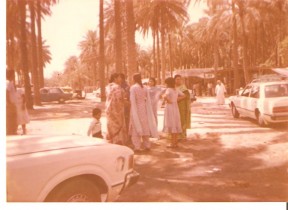 Nowhere, in the entire four years that Dad was posted there, did we see a single beggar, or even anyone who looked poor or bedraggled! The people had a red bloom to their cheeks and a shine in their eyes that spoke of good health and plenitude. All the children went to the Madarsas. And when monogamous Indians with small families shopped for a basket of figs, or a couple of melons, a small bunch of fresh dates, or a kilo of black grapes, the shopkeepers, accustomed to polygamous patriarchs buying by the dozen or the bushel, would often waive off the payment!
Nowhere, in the entire four years that Dad was posted there, did we see a single beggar, or even anyone who looked poor or bedraggled! The people had a red bloom to their cheeks and a shine in their eyes that spoke of good health and plenitude. All the children went to the Madarsas. And when monogamous Indians with small families shopped for a basket of figs, or a couple of melons, a small bunch of fresh dates, or a kilo of black grapes, the shopkeepers, accustomed to polygamous patriarchs buying by the dozen or the bushel, would often waive off the payment!
The cost of daily rations, food items, even clothes, electricity, water, was subsidized beyond the dreams of benevolence! The department stores overflowed with luxury items from all over the world—feather-soft Spanish pure-wool blankets, the finest crockery and cutlery (lead crystal, pyrex ware, hand-painted porcelain), musical stuffed toys, the most advanced science toys (mini-microscopes, mechanical, electrical and magnetic kits), the finest cloth-stuffs (chamois satin, velvets, suedes), the last word in processed foods (flavoured condensed milk, powdered milk, all the international brands of tea, coffee, aerated drinks, tinned foods, etc.) —all the elegances of life that one associated with Europe and USA, made available to the dutiful subjects of an oil-rich dictatorship.
The television and radio aired programs from all over the world. The medical facilities were an eye-opener—all kinds of pathological tests prescribed and conducted on the spot, the results out and the patient admitted, or sent home (according to need), within a few hours—at negligible cost! One really came to appreciate the meaning of the term ‘Gulf money’.
And yet, a menacing crackle in the air underlay the atmosphere as soon as one stepped out of the ‘Indian Colony’ adjacent to the construction site.
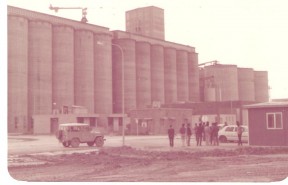 We, the children of the colony, were shown the boundaries beyond which we were not to step (Tuz Kharmatu was at the foothills of the Kurdish mountains, on the other side of which, Saddam’s genocidal crackdown on the rebellious Kurds was in process).
We, the children of the colony, were shown the boundaries beyond which we were not to step (Tuz Kharmatu was at the foothills of the Kurdish mountains, on the other side of which, Saddam’s genocidal crackdown on the rebellious Kurds was in process).
The drivers had strict instructions not to take the company cars (emblazoned with the company logo for easy recognition) anywhere except the markets for which they carried government permits. Saree-clad Indian women venturing into the markets on shopping expeditions were supposed to ensure that not a millimeter of abdominal skin was visible, because only belly dancers (read prostitutes) exposed their abdomens, and so, a woman exposing even a miniscule part of her abdomen was liable to be propositioned, or in extreme cases, stoned publicly!
Everyone (not only foreigners, but also citizens of the country) was supposed to carry identification, which could be scrutinized arbitrarily at any time. Men and women moving together needed to carry proof of their relationship, or else, run the risk of being publicly stoned to death for adultery without any sort of trial! Once, exclaiming at the sight of a barrow of peaches (called khumani in Hindi), I was shushed to silence in panic because khumani sounded like Khomeini, and as Iraq was then at war with the Ayatollah’s Iran, my childish delight could have had disastrous consequences!
All the shops, homes and offices—all structures surrounded by four walls—were required to sport large pictures of Saddam. (In fact, a German artist was commissioned to paint Saddam’s bust on the humungous grain silos, once they were completed, and which, we’re told, became extremely visible air targets for the allied attacks during the Gulf War, a decade later). Radio and television programs could be interrupted at any time to make way for coverage of Saddam’s activities, or else, songs in his praise. It was disconcerting indeed, when Marilyn Monroe on TV was rudely replaced by Saddam’s mug and a host of schoolchildren chanting something that sounded like ‘Sera… seram basera … sera … Saddam sera’!
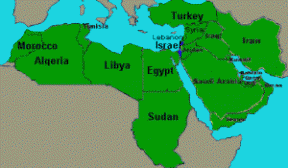 To cut a long story short, the ongoing spate of revolts against Arab dictatorships is, thus, an eventuality which had to occur, sooner or later. However, it in no way justifies the wanton destruction of Iraq by the oil-greed of the West operating in the guise of ‘Defenders of Human Freedom’ or, for that matter, the criminal sacrifice of Afghanistan on the altar of the Cold War with the erstwhile Soviet Union! Even in the current scenario, the ethicality of military intervention by the West in internal uprisings in Libya is highly questionable.
To cut a long story short, the ongoing spate of revolts against Arab dictatorships is, thus, an eventuality which had to occur, sooner or later. However, it in no way justifies the wanton destruction of Iraq by the oil-greed of the West operating in the guise of ‘Defenders of Human Freedom’ or, for that matter, the criminal sacrifice of Afghanistan on the altar of the Cold War with the erstwhile Soviet Union! Even in the current scenario, the ethicality of military intervention by the West in internal uprisings in Libya is highly questionable.
But, going back to where we started—ask the people who have been living in gilded cages for the past decades, why they wish to stretch their wings, even if they get a little less to eat!






So true – in a democracy like ours, freedom is such a loose term. Wish we all could claim that freedom is our birthright, and we shall have it!! You are brave, Parul 🙂 God bless!
Vivid trip down memory lane, took me along! As for dictators – their abnormal psychology prevails until kicked out.
To receive such an article one needs to have undergone the effects of dictatorship. Thus comes the article from ur experience of the ground realitiies. Since we indians of the day do not have such an experience its diffult to appreciate the fruits of freedom. And the freedom is now seen being abused by many.
Reading your article i am encouraged to feel that we need to have a dress code and enforcement of law.
Keep sharing such ideas so the readers at least may appreciate the situation.
Keep it up.
Regards
P.K. Jain